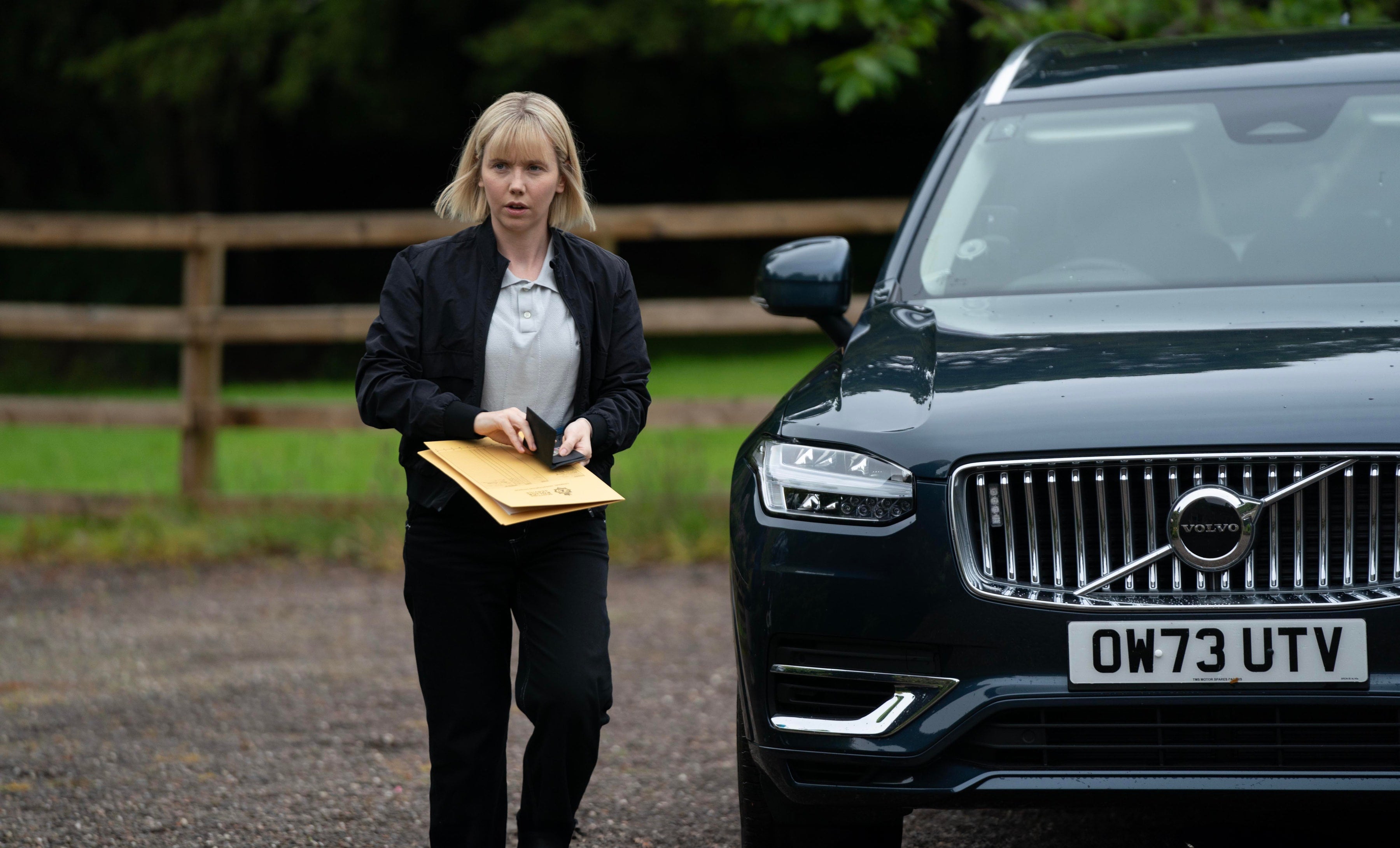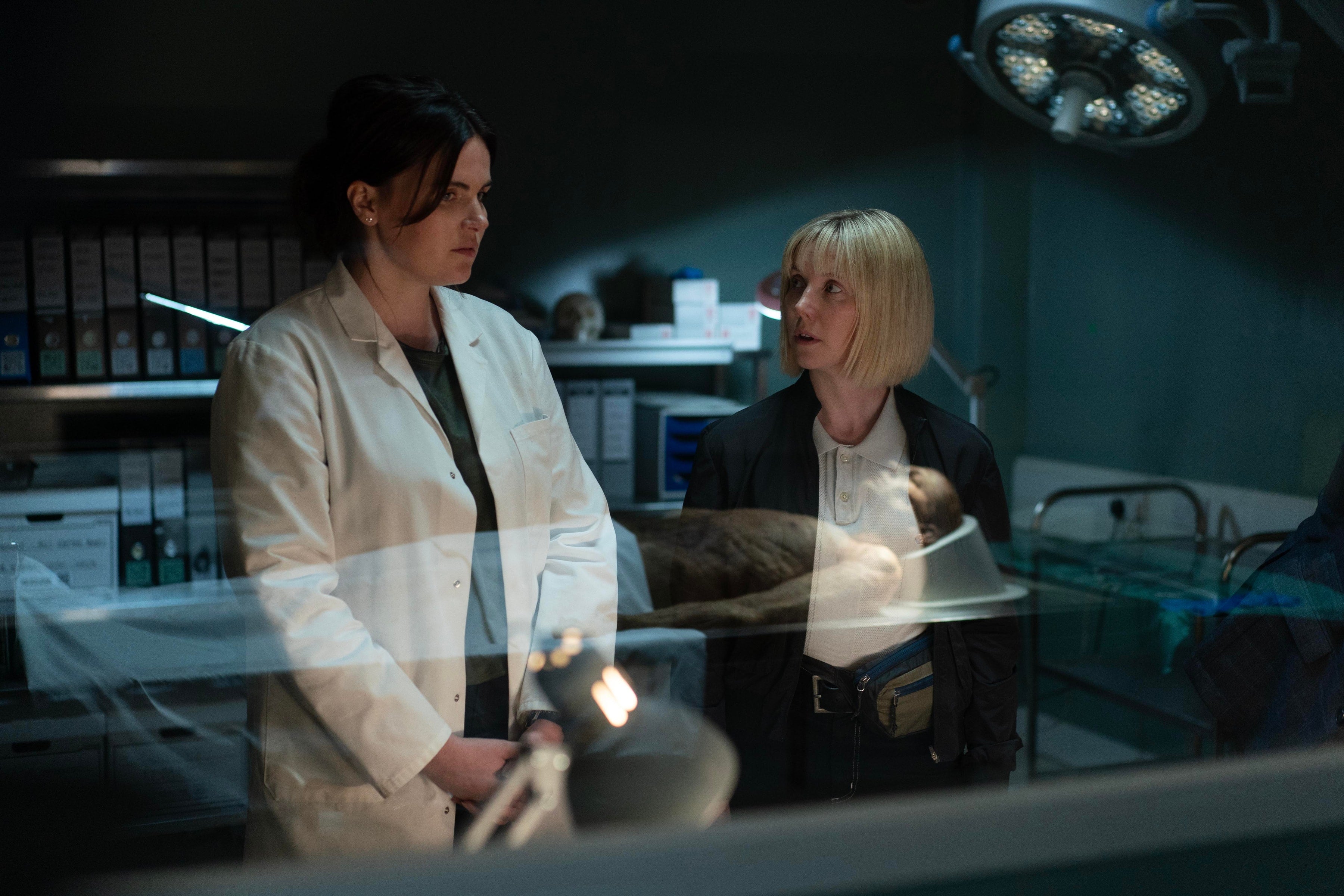I really enjoy that she gets to basically just tell a bunch of men that are much bigger and older than her to piss off,” Lauren Lyle says with a grin. The 32-year-old actor is telling me about the “delicious” catharsis that comes with playing Karen Pirie, the straight-talking, bumbag-wearing young detective who takes the title role in one of the most original British crime dramas in years. As a young woman, she notes, “I feel like I deal a lot with female rage. I’m interested in that, and in frustration. I feel like we’re always having to keep a lid on it. I don’t feel like we see that [emotion] very often, and it’s not allowed to breathe.”
With Karen, though, this fury isn’t just given space to breathe – it’s allowed to boil over completely. Towards the start of the second season of the ITV show, one of Karen’s police superiors describes her as “blinkered and extraordinarily rude” (would she just be called “blunt” if she were a bloke?). She also likes to unwind by screaming into the void, heavy metal blasting through the speakers. “It was really important to me to be able to show that frustration, and actually show what people do in their bedrooms, or f***ing screaming in the car,” the actor says. We’re speaking over Zoom, during the first of what will turn out to be several July heatwaves. She’s perched on the wooden floor of her London flat – blonde hair pushed back with a grey headband, glass of iced water in hand, Dyson fan blasting out cool air –because it’s just too warm to sit on the sofa behind her.
It’s a brilliant role for Lyle, and her first “proper effing lead”, as she puts it, with appealing candour, in softened Glaswegian tones. She grew up in the Scottish city’s Southside area, then her family relocated to New Zealand when she was in her teens, after her dad got a job in Auckland. “I’ve moved around a lot in my life, so I’ve had to tone down my accent,” she says. Before Karen Pirie, she had supporting parts in the Highlands-set, time-travelling period piece Outlander, as the quietly determined Marsali, and in the BBC’s claustrophobic Sunday night thriller Vigil, playing an anti-nuclear activist; since then, she’s appeared in Netflix’s Toxic Town and Saoirse Ronan-led book adaptation The Outrun.
As Karen, who’s the creation of legendary “tartan noir” novelist Val McDermid (when Lyle landed the role, her dad solemnly reminded her that McDermid is “the queen of crime”), she’s alternately drily funny and standoffish, wilfully naive and emotionally astute. In other words, she is a refreshing antidote to decades of programming about grizzled cops weighed down by divorces and drinking problems.
She wanted, above all, to stop the show from falling “into any cosy crime situation”, she adds. “Some people think ‘ITV detective’, and go to watch it and they’re like, ‘Woah. It’s so not what I expected it to be.’ And I love that.” So did critics and (arguably more importantly) viewers. The part has earned her two Bafta Scotland awards: Best Actress and the Audience Award for Favourite Scot on Screen (voted for by the public).

Basically, as she puts it, “it’s not Vera”. The fact that Karen lives in a bang-average houseshare with one of her colleagues, played by the show’s writer Emer Kenny, adds another enjoyable layer of realism. Lyle and Kenny quickly struck up a close, collaborative working relationship on season one, and have become such good pals that she’s been asked whether she “got [the role] because you’re her best friend, right?”.
For Lyle, Karen Pirie was her first lead acting role. For Kenny, it was her first time as a lead writer on such a high-profile show. The pair bonded over this shared milestone. And they also fed their own experiences of professional frustrations (being underestimated for looking young, for example) into the script. There’s one scene in season two where a potential suspect sniggers that Karen “looks like a toddler” that’ll trigger an eyeroll of recognition from anyone who’s still getting ID’d in their early thirties. “There are things like, as a woman, you get hugged a lot more in a professional environment than you get a handshake – things like that, this strange patronising that can go on,” Lyle says.
In the first series, a viral true-crime podcast about the murder of a young woman in St Andrews prompts Karen’s superiors to reopen the cold case investigation, 25 years later. It’s intended as a good PR move, and there are whispers that Karen has only been put on the job because of the “optics” of hiring a young, female officer. But Lyle and Kenny wanted the character to be “a girl that knows what it feels like to be scared to walk home, and knows what it feels like to be told to put her keys in her hands” if she felt under threat – essentially, for the case she’s solving to have real, personal resonance. The fact that they were filming in the spring of 2021, when news of the murder of Sarah Everard horrified the nation, gave the project an uncomfortable urgency, too.
It felt “quite profound”, Lyle says, to be a part of something that reminds us that violence against women “is happening, and we can’t just sit by and pretend it’s not”. In season two, the focus shifts to another cold case, centring around the abduction of an oil heiress and her baby son in the Eighties; it’s an investigation that raises questions about the ideal of the perfect, photogenic female “victim”, and how the media often becomes fixated on such stories.

Watch Apple TV+ free for 7 day
New subscribers only. £8.99/mo. after free trial. Plan auto-renews until cancelled.
Try for free
ADVERTISEMENT. If you sign up to this service we will earn commission. This revenue helps to fund journalism across The Independent.

Watch Apple TV+ free for 7 day
New subscribers only. £8.99/mo. after free trial. Plan auto-renews until cancelled.
Try for free
ADVERTISEMENT. If you sign up to this service we will earn commission. This revenue helps to fund journalism across The Independent.

Working on Karen Pirie, Lyle adds, has “alerted my eyes to the way that we use the death of women for entertainment” in pop culture. “With this show, I feel like we’ve been so aware not to do that.” In both seasons, she notes, it was imperative that the female victim “wasn’t just a body” and that they felt like fully rounded characters.
Beyond the investigation, though, the actor was keen that the show provided a realistic picture of what it’s like to grapple with the competing demands of work and, well, life in your twenties and beyond. “I love seeing the private life of Karen, dealing with her boyfriend,” she says. “There are so many breakups happening at the moment in my life, among my friends – it’s the season. I’ve just gone through one.” And there can be a strange disjunction, she adds, when things are going well professionally but you’re struggling personally. “As someone who’s told that I’m successful, when you have a break-up, you’re like, ‘What am I allowed?’” she says, alluding to the fact that, even in 2025, it can still feel a bit like women have to choose between their careers and their personal lives. “I think it really shows us the reality of what it is to be a young girl – can women have it all or not?”
Speaking to Lyle, you get the feeling that she shares the tenacity of her character. She describes how she “just burrowed my way” into the world of acting “because I had no one telling me what I’m supposed to do. My mum and dad couldn’t tell me what to do. I didn’t have friends in the industry. [I’m] truly suburbs of Glasgow, just not from that world.” She applied for drama schools over and over, coming close but repeatedly missing out on a place. So she moved to London, “and if I met an actor, I’d ask them about this, ask them about that”.
Lyle ended up joining a theatre company, acting at the Edinburgh Fringe, and securing “the smallest part in The Crucible at the Old Vic” in 2014, while also understudying for the three female leads. “So I basically did this insane drama school training in six months there,” she adds, and when she did eventually land a school place, she decided to keep working instead, joining the National Youth Theatre and filling any spare time with odd jobs. She was off to do a flyering gig when she got the call from Outlander that “fully changed my life”.
Next, she has directing in her sights, having just helmed her first short film. “I’ve wanted to direct for a really long time, and I think I was just too scared, or I didn’t have a lot of time,” she says. “So I just did it, got an opportunity, went for it and I’m definitely going to do more.” For a lot of her life, she says, “I’ve not really felt part of the gang”, but directing, “being part of every conversation, being a part of the whole”, fulfilled that. “All I want in my life is community and collaboration, and nothing brings me more joy than the team all getting together.”
‘Karen Pirie’ season two is on ITV and ITVX from 20 July
.png?width=1200&height=800&crop=1200:800)




